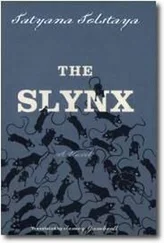He paced the room in his socks, scratched his head, smoked by the window, and stuck the butts in the flower pots, packed his razor in his suitcase: he planned to go back to Yevgeniya Ivanovna. The clock ticked, Isolde cried, not understanding, promising to die, there was slush beneath the window. Why make a scene? Why didn’t she grind some meat and make patties instead? I said I was leaving, that meant I was leaving. What was unclear about that?
Yevgeniya Ivanovna was so glad she baked a carrot pie, washed her hair, polished the floors. He celebrated his fortieth birthday first at home, then in a restaurant. They packed the uneaten fish and jellied meat in plastic bags, and there was enough for lunch the next day. He got good presents: a radio, a clock with a wooden eagle, and a camera. Yevgeniya Ivanovna had been dreaming of being photographed at the beach in the surf. Isolde did not control herself and sort of ruined the party. She sent some stuff wrapped in paper and an unsigned poem, in her childish handwriting:
Here is a gift for you in parting:
Candle stub,
Shoe laces and a plum pit.
Look closely and smile crookedly.
This was
Your love until it died:
Fire, and skipping, and sweet fruit
Above the abyss, and the brink of disaster.
She was no longer alive.
And now he was sixty, and the wind blew up his sleeves, into his heart, and his legs refused to go. Nothing, nothing was happening, nothing lay ahead, and really there was nothing behind, either. For sixty years he’d been waiting for them to come and call him and show him the mystery of mysteries, for red dawn to blaze over half the world, for a staircase of rays to rise from earth to heaven and archangels with trombones and saxophones or whatever they used to blare their unearthly voices to welcome the chosen one. But why were they taking so long? He’d been waiting his whole life.
He hastened his step. While they shaved Yevgeniya Ivanovna’s neck, boiled her head, and bent her hair with metal hooks, he could reach the market and have some warm beer. It was cold, his fur coat was cheap, a fur coat in name only—fake leather lined with fake fur—which Yevgeniya Ivanovna bought from a speculator. “She skins crocodiles for herself, though,” thought Vassily Mikhailovich. They had gone to the speculator—for crocodile shoes, the fur coat, and other trifles—in the evening, searching a long time for the right house. It was dark on the landing, they felt around, having no matches. Vassily Mikhailovich swore softly. To his amazement he felt a peephole at knee level on one of the doors.
“That’s the right place, then,” his wife whispered.
“What does she do, crawl around on all fours?”
“She’s a dwarf, a circus midget.”
With bated breath he felt the nearness of a miracle: beyond the vinyl-covered door, perhaps the one and only door in the world, gaped the passageway into another universe, breathed living darkness, and a tiny, translucent elf soared among the stars, trembling on dragonfly wings, tinkling like a bell.
The dwarf turned out to be old, mad, mean, and didn’t let them touch any of the things. Vassily Mikhailovich surreptitiously looked at the bed with the stepladder, the children’s chairs, the photographs hung low, just above the floor, testimony to the faded charms of the lilliputian. There, in the pictures, standing on the back of a dolled-up horse, in ballet togs, in glass circus diamonds, happy, tiny, the young speculator waved through the glass, through time, through a lifetime. And here, pulling enormous adult clothing out of the closet with tiny wrinkled hands, the evil troll ran back and forth, the guardian of underground gold, and the Gulliver shadow cast by the low-hanging lamp also ran back and forth. Yevgeniya Ivanovna bought the fur coat, and the crocodile shoes, and a winking Japanese wallet, and a scarf with Lurex threads, and an arctic fox skin for a hat from the horrible child, and while they made their way down the dark stairs, supporting each other, she explained to Vassily Mikhailovich that you clean arctic fox with farina grains heated in a dry skillet, and that the skin side of the fur should be kept away from water, and that she now had to buy a half meter of plain ribbon. Vassily Mikhailovich, trying not to remember any of this, thought about what the dwarf had been like in her youth, and whether dwarfs can marry, and that if they were to jail her for speculation, the prison cell would seem so big and frightening to her, every rat would be like a horse, and then he imagined that the young speculator was imprisoned in a gloomy barred castle with nothing but owls and bats: she wrung her doll-like hands, it was dark, and he was creeping toward the castle with a rope ladder over his shoulder through the evil grounds; only the moon ran behind the black branches like a silver apple, and the dwarf clutched the bars of her window and squeezed through, transparent as a lollipop in the moonlight, and he climbed up, tearing his fingers on the mossy medieval stones, and the guards were asleep leaning on their halberds, and a raven steed pawed the ground below ready to gallop around the sawdust arena, on the red carpet, around and around the circle.
The time allotted to Vassily Mikhailovich was running out. The ocean was behind him, but the unexplored continent had not blocked his path, new lands had not floated out of the mist, and with depression he could make out the dreary palms and familiar minarets of India, which the miscalculating Columbus had thirsted for and which meant the end of the road for Vassily Mikhailovich. The trip around the world was coming to an end: his caravel, having circled life, was sailing up from the other side and was entering familiar territory. The familiar social security office, where the pensions fluttered on flag poles, hove into view, then the opera house, where Svetlana’s son, wearing stage eyebrows, sang about the ephemerality of life to the loud applause of Yevgeniya Ivanovna.
“If I run into Isolde,” Vassily Mikhailovich made a bet with fate, “my path is over.” But he was cheating: Isolde had passed away a long time ago.
Sometimes he still got signals: you are not alone. There are clear meadows in the groves of people, where in hermits’ cabins live the ascetics, the chosen who reject the bustle, who seek the secret loophole out of prison.
News arrived: strange objects were appearing, at first glance insignificant, useless, but imbued with a secret meaning; indicators leading to nowhere. One was Cheburashka, a daring challenge to school Darwinism, an old shaggy evolutionary link that fell out of the measured chain of natural selection. Another was Rubik’s cube, a breakable, changeable, but always whole hexahedron. Having stood four hours in the cold along with thousands of grim fellow sect members, Vassily Mikhailovich became the owner of the marvelous cube and spent weeks twisting and twisting its creaking movable facets, until his eyes grew red, waiting in vain for the light to another universe to shine at last from the window. But sensing one night that of the two of them, the real master was the cube, which was doing whatever it wanted to with helpless Vassily Mikhailovich, he got up, went to the kitchen, and chopped up the monster with a cleaver.
In anticipation of revelation he leafed through typewritten pages that taught you to breathe a green square in through one nostril at dawn and to chase it with mental power up and down your intestines. He spent hours standing on his head with his legs crossed in someone’s apartment near the railroad station, between two unshaven, also upside-down engineers, and the rumble of the trains outside the house speeding into the distance shook their upraised striped socks. And it was all in vain.
Читать дальше












